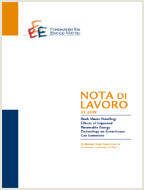Rent Seeking and Power Hierarchies: A Noncooperative Model of Network Formation with Antagonistic Links

20.04.2014
Kenan Huremovic
D85,D74
Network Formation, Structural Balance, Contest
Climate Change and Sustainable Development
Carlo Carraro
Network structure has a significant role in determining the outcomes of many socioeconomic relationships, including the antagonistic ones. In this paper we study a situation in which agents, embedded in a network, simultaneously play interrelated bilateral contest games with their neighbors. Interrelatedness of contests induces complex local and global network effects. We first characterize the equilibrium of a game on an arbitrary fixed network. Then we study a dynamic network formation model, introducing a novel but intuitive link formation protocol. As links represent antagonistic relationships, link formation is unilateral while link destruction is bilateral. A complete k-partite network is the unique stable network topology. As a result, the model provides a micro-foundation for the structural balance concept in social psychology, and the main results go in line with theoretical and empirical findings from other disciplines, including international relations, sociology and biology.
***
Suggested citation: Huremovic, K., (2014), ‘Rent Seeking and Power Hierarchies: A Noncooperative Model of Network Formation with Antagonistic Links’, Nota di Lavoro 45.2014, Milan, Italy: Fondazione Eni Enrico Mattei.
